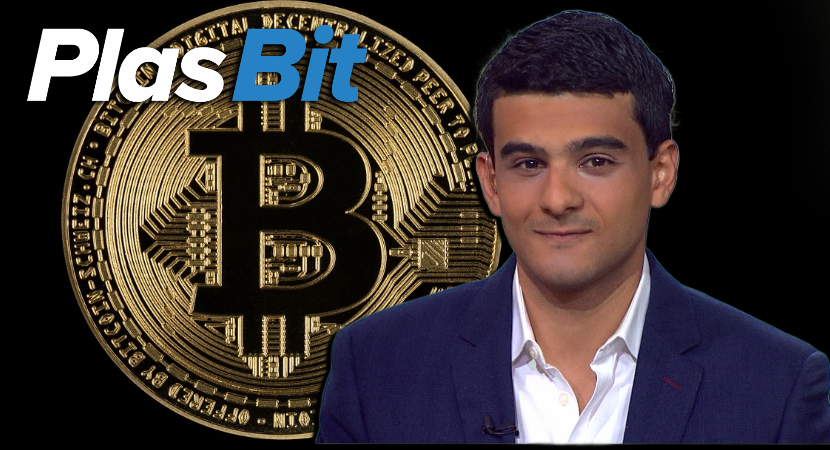If you’re wondering who is Michael Marquardt better known as “Theymos”, he was the main admin of the original Bitcoin forum, Bitcointalk.org, the head moderator of the r/Bitcoin subreddit, and the creator of the first Bitcoin explorer, blockexplorer.com. He was also among the supporters of the increase of the Bitcoin block size during the infamous ‘Blocksize War’, which caused a lot of personal backlash from the Bitcoin community. In this article, we’ll find out who Michael was and talk about his role in leading the Bitcoin community in the early days of Bitcoin adoption, how he helped publicize Bitcoin in the early years, and whether his controversial reputation is justified or not.
Who Is Michael Marquardt?
Michael Marquardt, or “Theymos,” is a legendary, although slightly divisive, figure in the Bitcoin world. He’s not a coder or a developer but an influencer who managed the main Bitcoin forum, Bitcointalk.org, a go-to cryptocurrency discussion board since the early days, founded by none other than Bitcoin’s pseudonymous creator, Satoshi Nakamoto. He is also a moderator for the r/Bitcoin subreddit, which has grown to more than 4 million members. It’s fair to say that Michael does more than just moderate chat and is viewed by some as a controversial figure. The so-called “Blocksize War” broke out between 2015 and 2017, with Marquardt right in the middle of it. It was a big debate about how to scale Bitcoin, with the community unable to agree on block size. This led to a split and the creation of Bitcoin Cash. Marquardt’s critics allege that he used his influence to filter out pro-Bitcoin Cash views. Apparently, he kept the focus on Bitcoin Core and SegWit.
- Bitcoin Cash: Bitcoin Cash (BCH) split from Bitcoin (BTC) in 2017 to enable faster, cheaper transactions, staying true to the original vision of a practical peer-to-peer currency. With larger blocks (32MB vs. Bitcoin’s 1MB), Bitcoin Cash processes more transactions per block, reducing wait times and fees. While Bitcoin is seen more as an investment, Bitcoin Cash focuses on everyday usability, though widespread adoption remains a goal.
- Bitcoin Core: The blockchain-based software of Bitcoin, originally created by Satoshi Nakamoto to verify transactions and keep the network decentralized. It operates as a full node, validating the entire blockchain while also serving as a secure wallet. Known as Bitcoin's "reference implementation," Bitcoin Core is trusted globally and helps keep Bitcoin running smoothly without any central control.
- SegWit: Short for “Segregated Witness”, it’s a Bitcoin upgrade that moved transaction signatures out of the main block data, freeing up space and enabling faster, cheaper transactions. It also prevents transaction malleability, which keeps transaction details secure. The overall idea of SegWit was to boost Bitcoin's capacity and lay the groundwork for further network improvements.
One of the big controversies was around "soft forks" like SegWit. Some users felt SegWit was being pushed aggressively as a fix-all solution, and there were worries that Blockstream, a company backing SegWit, might benefit financially if Bitcoin moved toward the Lightning Network. Theymos supported this shift, and for some people, that raised questions about how decentralized the conversation around Bitcoin really was. Some say he protected Bitcoin’s core philosophy and kept scams and misinformation at a minimum. However, others think he stifled open debate.
Theymos and the First Transparent Blockchain Explorer
While Theymos is best known as a moderator for Bitcointalk.org and the r/Bitcoin subreddit, he also made a technical contribution by developing the first blockchain explorer, blockexplorer.com. This early tool allowed users to view Bitcoin transactions on the blockchain, improving transparency. Blockexplorer.com became a foundational part of Bitcoin’s ecosystem, helping demystify blockchain technology in the network’s formative years. Eventually, blockexplorer.com was surpassed by blockchain.info around 2011, a platform that offered a user-friendly interface and a suite of advanced visualizations that appealed to the growing number of Bitcoin users.

The Reddit Open Letter Controversy
Another event that caused controversy was a Reddit post published in 2017, shortly after the Blocksize War. The open letter accused Michael Marquardt of bullying and misusing his power in the forum’s trust system. The user claimed to be a core member of the community, saying they contributed a lot, even helping build the merit system. However, they felt betrayed by Marquardt's leadership. They mentioned harmful experiences, claiming Marquardt's trust was used to back false allegations against them. We won’t reprint the accusations here, as we don’t want to spread gossip and rumors, but you can read them for yourself in the letter. The letter implies that Marquardt has been in an unaccountable position of power for too long. The writer suggested launching investigations into Marquardt's role in alleged financial issues. It’s unclear whether these investigations ever took place and, if so, whether any evidence of wrongdoing was revealed.
The Blocksize War – In-Depth Analysis
The Blocksize War describes the deep and prolonged dispute over how to scale the Bitcoin network. The central issue was the "Blocksize Debate." One faction, favoring larger block sizes, argued this would allow the network to process more transactions per block, potentially speeding up the network and reducing transaction fees. This group saw Bitcoin as a more user-friendly and scalable payment system, aligning with the vision of "digital cash." On the other side, Bitcoin Core developers and many long-time supporters believed increasing block sizes could make it less decentralized. They feared larger blocks would make it harder for smaller, independent nodes to take part, increasing reliance on larger, centralized nodes and threatening Bitcoin’s core value of censorship resistance. They championed a different scaling approach that was more in favor of "off-chain" solutions like the Lightning Network, allowing faster transactions without modifying Bitcoin’s base layer. The clash led to a divide, resulting in a hard fork that created Bitcoin Cash (BCH) in 2017.
The new cryptocurrency adopted larger blocks, emphasizing faster transactions, while Bitcoin maintained its smaller blocks and decentralized approach. The split highlighted differences in philosophy, with Bitcoin Core supporting a "store of value" narrative, while Bitcoin Cash aimed to function as a more instant form of peer-to-peer digital cash. The Blocksize War unofficially came to an end with the Bitcoin New York Agreement (NYA). It was a compromise between 58 industry leaders, such as top miners and exchange operators, who came together from 22 different countries to sign an agreement in New York City in 2017. The agreement aimed to improve Bitcoin’s transaction speed and scalability through a proposal called "SegWit2x". The plan involved two main changes:
- Implementing Segregated Witness (SegWit) to boost transaction capacity
- Conducting a hard fork to double the block size allowing for faster global transactions.
While the goal was to create a smoother transaction experience, the proposal faced mixed reactions, with only SegWit moving forward and the block size increase leading to a separate initiative that created Bitcoin Cash. The Civil War showed the challenges of decentralized governance. Each side accused the other of undermining Bitcoin’s principles. It highlighted the difficulty of reaching a consensus in a leaderless, global network. The NYA also set a precedent for how Bitcoin handles internal disagreements and external pressures.
How Did Michael Marquardt (Theymos) Contribute to The Blocksize War?
Michael Marquardt found himself on the frontline of the Blocksize War as both the moderator of Bitcointalk.org and the influential subreddit r/Bitcoin. His role was controversial due to his strict approach to content moderation, which some felt clashed with Bitcoin’s ethos of free speech and decentralization. As tensions rose over the block size debate, where supporters of larger blocks wanted a more scalable Bitcoin and others argued for preserving Bitcoin's decentralized nature, Theymos’s actions began to polarize the community. Marquardt’s critics accused him of censoring discussions in favor of the “small block” side. As he restricted posts supporting Bitcoin XT, the new client for increased block size, large blockers argued that censorship stifled open debate and prevented community consensus. The moderation policies, particularly on r/Bitcoin, allegedly banned Bitcoin XT promotions and strictly controlled conversations about hard forks, which Marquardt argued would only fragment the network further. In doing so, he claimed he was protecting Bitcoin’s integrity, but this heavy-handed approach deepened divisions.
By moderating content that diverged from Bitcoin Core’s path, Theymos amplified the voices aligned with Bitcoin Core’s more conservative stance. Many were happy about his efforts to safeguard against misinformation, seeing his actions as necessary to protect Bitcoin. Others viewed this as overreach, accusing him of using his position to shape Bitcoin’s future according to his views and those of a select group rather than reflecting a true consensus. Theymos’s actions during the Civil War, while they were probably well-intentioned, became a lightning rod in the debate about power and censorship in decentralized systems. The fallout of this rift still rumbles on and is hotly debated on both sides. Overall, Theymos has always been optimistic about Bitcoin's long-term potential but speculated that transaction fees could drive future users toward second-layer solutions (e.g., the Lightning Network). This foresight aligns with the current scaling debate and the ongoing push for layer-2 solutions. He was critical of altcoins that simply copied Bitcoin’s code, asserting that only genuinely innovative or structurally different coins would ever compete with Bitcoin. This reflects his purist stance.
What Is Bitcointalk.org?
Bitcointalk is a forum created in 2009 by Satoshi Nakamoto. It initially focused on Bitcoin only, but has since grown to cover various cryptocurrencies and blockchain projects. It was one of the main go-to places for Bitcoin and crypto fans, before Discord came along. You’ll still find plenty of coders, miners, and crypto enthusiasts hanging out there. Members from all over the world chat in multiple languages, talking about crypto basics to investment strategies. Bitcointalk even hosted the first Ethereum announcement. Bitcointalk.org hosts hundreds of boards or sub-forums, including the following.
- Bitcoin Discussion: Covers general topics about Bitcoin’s ecosystem, community news, and innovations.
- Development & Technical Discussion: Focuses on Bitcoin’s technical aspects, including development, bug reports, and network issues.
- Mining: Dedicated to discussions on Bitcoin mining, equipment, software, and support.
- Economics: A board where members discuss economic theories, trends, and speculation within the crypto market.
- Marketplace: A bustling section for buying, selling, and trading Bitcoin-related goods and services.
Other areas cover altcoin discussions, regional boards in multiple languages, beginner help sections, and even off-topic discussions, making Bitcointalk a comprehensive resource for all things crypto.
From “Nerdy Underdogs” To Global Powerhouse
Bitcointalk started out as a fringe group of techies, crypto nerds, and libertarians intrigued by the idea of decentralized money. They saw Bitcoin as a way to bypass traditional financial systems and create something truly independent. It was a bit of a digital “wild west,” with folks experimenting, debating, and troubleshooting bugs in real-time. As Bitcoin grew and started making the mainstream news, more people saw its potential as a new asset class. Slowly, investors, financial advisors, and Wall Street types started taking an interest. When companies like BlackRock started pushing for Bitcoin ETFs, it was a signal that Bitcoin had officially gone mainstream. Now, Bitcoin is moving past the early adopter and risk taker stage. It has taken its place in institutional portfolios and become a respected asset in the financial world. Even though the crypto landscape has evolved, the community still has a spirit of innovation, as you’ll see if you scroll through the lively forums.
The Impact of Bitcointalk
There’s no doubt that Bitcointalk.org has had a big impact on the world of crypto and blockchain. The things users like the most are the vast amounts of helpful information on there and a strong sense of community. For anyone involved in developing and launching an ICO or blockchain project, Bitcointalk.org is an important place to drum up publicity and get exposure. The community has more than three million members, so even getting noticed by a small percentage of users can help make your project succeed. In general, there are four main ways that people use Bitcointalk.
- Knowledge & Earning Potential: Users can “earn as they learn” through active participation and signature campaigns.
- Project Visibility: Even reaching a small segment of the community can generate substantial buzz.
- Community Trust: Engaging transparently builds a loyal following, which is essential for long-term project success.
- Networking Opportunities: Connects developers, investors, and enthusiasts worldwide, fueling collaboration and innovation.
Bitcointalk has built a proud legacy, but in today’s decentralized era, it faces challenges. New platforms offer decentralized ownership, token-based rewards, and even DAO-style governance, Bitcointalk will need to adapt to maintain its relevance.
- A few possibilities could keep it strong.
- Adopting decentralized principles
- Integrating a blockchain-based reputation system
- Offering incentives for community-led moderation.
Embracing some of these Web3 elements will help Bitcointalk improve its trust model and evolve with blockchain tech.
Other Key Figures in Bitcointalk.org
In the early days of Bitcointalk, Martti Malmi, also known as "Sirius," played a major role in establishing and maintaining the forum. Martti, an early Bitcoin developer closely connected with Satoshi Nakamoto, not only supported Bitcoin’s initial technical developments but also helped Satoshi transition from the original SourceForge forum to Bitcointalk.org. As Satoshi gradually faded from public view, Martti assumed responsibility for managing the technical aspects of Bitcointalk, providing hosting, and ensuring that the community had a stable, reliable platform for Bitcoin discussions. He also managed Bitcoin.org, worked on the user interface, and helped develop the early versions of the Bitcoin software. His role in setting up Bitcoin’s first online presence and guiding community discussions on the emerging technology laid a strong foundation for its future. What's interesting about Martti is that he also embodied Bitcoin’s ethos of decentralization and autonomy. In fact, he voluntarily left his involvement with Bitcoin when he felt the project was growing beyond his role, making sure it could evolve freely. Hal Finney was a pioneer in the world of cryptography and Bitcoin's early development. Best known as the first person to receive a Bitcoin transaction directly from Satoshi Nakamoto, Finney believed strongly in the promise of decentralized currency and digital privacy. His background with PGP encryption gave him a unique understanding of cryptographic principles and privacy tech, which aligned well with Bitcoin's ideals. Finney actively collaborated in early Bitcoin discussions on Bitcointalk, supporting and testing the network as it developed, with a commitment to digital freedom and security.
The Role of Moderators in the Web3 Community
As you probably already know, Bitcoin laid the foundations for Web3. Indeed, many of the Web3 forums that exist today are a direct offshoot from the OG forums like Bitcointalk. Web3 is more about decentralized applications (dApps) that run on blockchain networks, aiming to create a more open and user-controlled internet. While Bitcoin is decentralized, it was primarily designed as digital money rather than a platform for building dApps. Building trust is huge in Web3. It’s the glue that holds these online communities together. When people join a crypto or blockchain project, they’re often in unfamiliar territory. A strong community helps people feel they’re part of something bigger, while also offering support and insights. For instance, an active community might notice bugs or suggest new features, which the project team can act on. It's like having a team of unofficial “beta testers” on standby. Moderation of crypto and Web3 forums is usually done by allocating certain roles.
Community Manager Role
The community manager sets the community’s goals and plans activities to hit targets. For example, if the goal is to increase engagement, a community manager might host a weekly “Ask Me Anything” session or organize giveaways. These events give members a reason to be active and help build relationships. It’s also the community manager’s job to bring new people in, so they might work closely with social media channels or partner with other crypto communities to promote the project.
Community Moderator Role
Think of the community moderator as the bouncer and peacemaker. Their job is to monitor forums and chat rooms, keep conversations on track, and deal with issues. In the fast-paced world of crypto, there are always spammers, trolls, and other bad actors trying to mislead others. A good moderator handles these situations swiftly, removing harmful content and stepping in if a conversation gets out of hand. They also help organize discussions, so if a debate about a new feature starts to get too heated, they can step in to remind everyone of the community guidelines and keep the chat constructive.
Outsourcing to Agencies
Some communities hire moderators from agencies for larger projects. Agencies offer teams that provide round-the-clock support. An agency handles the daily grind of moderation, community events, and engagement tracking, allowing the core team to focus on development.
Collective Decision Making & Decentralized Governance
In decentralized governance, the aim is for the people within the community to drive all the decisions in a fair and democratic way. It’s a structure that’s governed by consensus rather than central authority. It’s all about autonomy and freedom, but introduces complex challenges in practice. For Michael Marquardt, this meant walking the fine line between free speech and making sure that discussions were high quality. In his attempt to tackle misinformation, many thought he was trying to stifle voices, but it backfired. This tension is a big challenge for decentralized platforms – how to stay ideologically neutral while keeping the community fair and focused. The potential for subjective bias in moderation, especially on centralized platforms like Bitcointalk, raises questions about power in “leaderless” structures. Marquardt’s moderation style brought both support and criticism, spotlighting the fine line between responsible governance and overreach. For decentralized communities, this is a double-edged sword. It’s foundational for integrity, but also adds a vulnerability that can be used to shape community perception. At Plasbit, we’re committed to keeping the dialogue open, fair, and friendly by providing in-depth content that explains things clearly and accurately.







